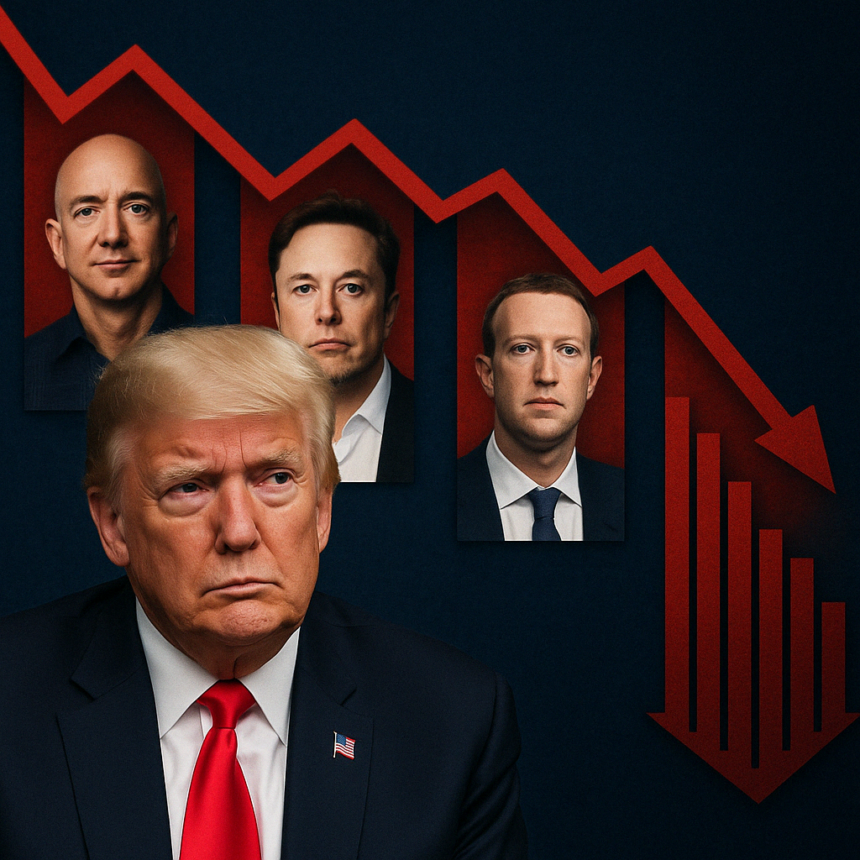Silicon Valley’s most prominent tech executives who supported President Donald Trump’s re-election are now watching their fortunes dip due to the administration’s controversial trade policies. From Elon Musk to Mark Zuckerberg, these titans, who had long enjoyed favorable conditions under Trump’s deregulation policies, are now grappling with billions of dollars in losses. Despite their backing, which included large donations to his political campaigns and support for his business-friendly initiatives, the Trump administration’s tariff policies have rocked the companies they lead. The fallout has been felt across the board, as Tesla, Meta, and Amazon struggle with the economic consequences of these policies.
What’s Happening & Why This Matters
In the first months of Trump’s second presidency, many of Silicon Valley’s wealthiest and most powerful figures saw a chance to benefit from his administration. They expected reduced regulatory oversight, a pro-business environment, and favorable tax breaks to fuel growth. Names like Elon Musk, Jeff Bezos, and Sundar Pichai — Tesla, Amazon, and Google executives — saw opportunities to expand their influence… and profits. They visited Trump at his Mar-a-Lago estate, offered advice, and lent political support. Even Zuckerberg of Meta was in on the act, showing support and hoping to benefit from Trump’s economic policies.
However, the reality of Trump’s tariff war with China and other trading partners has changed. While some companies briefly saw market rebounds due to temporary tariff pauses, trade wars’ overall impact has hurt the companies these tech executives thought would thrive. The primary issue? Tariffs on technology products. Tesla, for example, has been walloped by the additional costs associated with manufacturing vehicles in China, making the company’s profit margins tighter and reducing its stock value. The company’s stock has dropped 28%, wiping billions off Musk’s personal wealth. Despite being a strong Trump supporter, Tesla’s CEO has seen his net worth shrink by $143 billion. Similarly, Meta has seen a $35.8 billion loss in market capitalization.
The impact is also felt among other tech leaders. While companies like Google and Apple hoped that a Trump administration would relax antitrust investigations and regulations, they, too, are grappling with the economic fallout. Trump’s push for tariffs on Chinese goods has increased prices for manufacturers and consumers and strained the global supply chain, which is vital for tech companies. The loss of these billions comes despite the hopes that lower taxes and fewer regulatory hurdles would allow these companies to expand more rapidly.

Even though these executives supported Trump for his tax cuts and pro-business policies, the reality of his tariffs on foreign goods has created significant headwinds. Despite benefiting from specific policies, companies in Silicon Valley are now seeing their earnings drop due to factors such as decreased consumer demand, the uncertainty of the trade war, and inflationary pressures. The tech sector has seen $1.8 trillion wiped off its collective value, and investors are becoming more cautious about the market’s stability under these conditions.
TF Summary: What’s Next
As the trade war continues between the U.S. and China, and tariffs on technology products remain, Silicon Valley is adjusting strategies to manage the impact on profits. The companies once touted as the biggest winners of the Trump administration’s business policies are now adjusting to a reality where their business models might not be as resilient as they once thought. Tesla, Meta, and Amazon must navigate these challenges to stay competitive. As tariffs remain a central issue, the tech sector faces difficult choices — whether to pass costs onto consumers, move manufacturing operations, or absorb the financial losses. Additionally, the uncertainty around global trade harms the sector’s growth.
— Text-to-Speech (TTS) provided by gspeech


